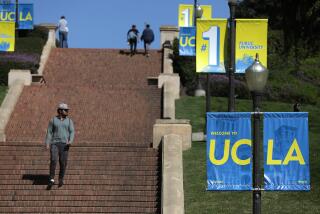French University System--Mess Defies Easy Solution
- Share via
PARIS — Students, teachers and politicians agree that the French university system is a mess, but all sound hopelessly confused when they talk about setting things right.
That confusion is at the heart of the violent student protest that has challenged the government of Premier Jacques Chirac.
The proposed legislation that has provoked the students would make so few changes, at least on the surface, that it is obvious that much deeper forces are at work than the objectionable clauses in the bill. Student protesters have been the government printing office’s best customers for copies of the bill at three francs (45 cents) each. But much of their anger at the bill comes out of reading between the lines.
The students are frustrated by a system that will grant degrees to only a minority of them. As a result, many are worried about finding work in the future. Their reading of the bill makes them feel that its clauses would only worsen the problem. On top of this, the students have obviously been irritated as well by the authoritarian manner of the Chirac government and its failure to consult them before fashioning legislation so vital to them.
According to current statistics, only 45,000 of the 180,000 (or one out of four) French students who enter their first year in university will earn a diploma that is equivalent to an American bachelor’s degree. Another 15,000 will earn a lesser certificate at the end of two years of study. But 120,000--two-thirds of the original class--will drop out along the way with no certificate or diploma of any kind.
In general, the proposed law, which was prepared by Minister of Higher Education Alain Devaquet, a 44-year-old former university professor, aims at improving standards at the 70 French universities by giving them autonomy to set their own entrance and course requirements. The students, however, denounce this as an elitist program.
In fact, the present French university system is oddly both elitist and egalitarian at the same time. On the one hand, everyone who earns a baccalaureate--the prized certificate that goes to those who pass a stiff examination at the end of secondary school--has the right to enter a French university, all of which are run by the government.
Yet the leaders of France come almost exclusively from a handful of elite, post-graduate schools which admit students only after an excruciating entrance examination for which university graduates sometimes take a year off to prepare. Premier Chirac, former President Valery Giscard d’Estaing, former Premier Laurent Fabius, and popular Socialist leader Michel Rocard, for example, are all graduates of the National School of Administration.
The students have three main criticisms of the controversial legislation, on which the French government Friday deferred consideration:
--It would allow universities to set entrance requirements both for the university and for certain faculties. To some extent, this happens anyway. Some universities accept students with the baccalaureate in the order in which they apply. But others, like the University of Paris at the Sorbonne, for example, have rigid entrance requirements. The students know this but insist that the elitist trend should be turned back and not encouraged by a new law.
--The legislation would allow the universities to increase their fees. The government says that it plans to allow universities at first to do no more than double the present matriculation fee of 400 francs ($60) a year. Higher education is free but the universities levy the fee to cover administrative, enrollment and insurance costs. Students recognize that the French fee, even when doubled, would still be far less than those in a country like the United States. But the students note that the law opens the gates for possible escalation of costs in the future, thus putting the universities out of the range of poorer students.
--The legislation would allow universities to issue their own diplomas. At present, students receive the same national diploma no matter which of the 70 universities they attend. Autonomous universities setting their own entrance requirements and issuing separate diplomas, according to the students, would make the system even more elite, with the diplomas of one university surely having more value than the diplomas of another.
In short, the students seem to be worried that the system will change in a way that would make it even more difficult for them to earn a diploma and a good job afterward.
Yet their objections seem much more strident than warranted by the legislation. Trying to explain this, Pierre Bourdieu, a sociologist at the College of France, an institute of eminent scholars, said that the students may be reacting as well against what they regard as “a refusal of generosity” on the part of the Chirac government--that it is more concerned with streamlining the universities to meet the marketplace than with dealing with the anxieties of the students about their future.
More to Read
Sign up for Essential California
The most important California stories and recommendations in your inbox every morning.
You may occasionally receive promotional content from the Los Angeles Times.










